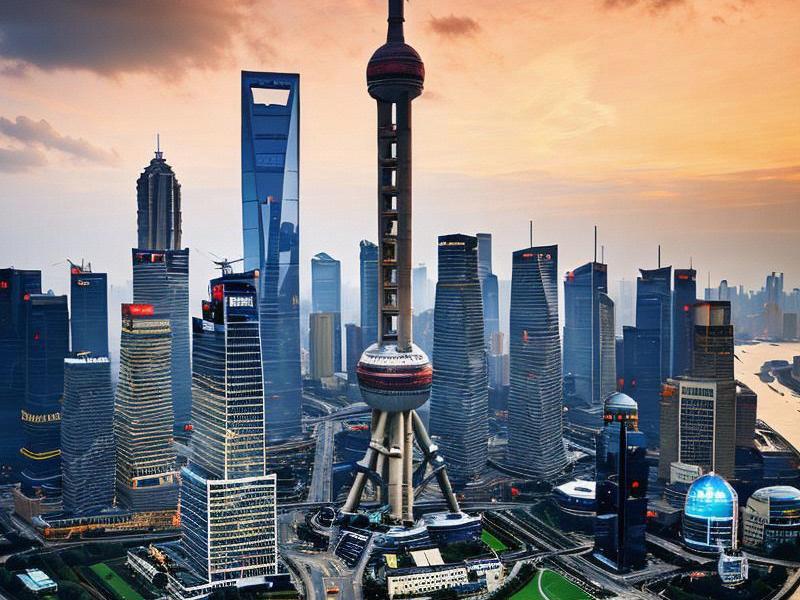
Shanghai, often referred to as the "Pearl of the Orient," stands as a testament to China's rapid transformation and economic rise. This city, with its unique blend of history and modernity, has captivated the world's attention and continues to evolve at an unprecedented pace.
Nestled on the eastern coastline of China, Shanghai's strategic location has made it a pivotal player in both domestic and international trade. Its history dates back thousands of years, but it was during the 19th century that Shanghai truly emerged as a global city. The opening of the Shanghai Port in 1843 marked the beginning of its transformation into a major trading hub, attracting merchants and immigrants from around the world.
As Shanghai grew, so did its cultural diversity. The city became a melting pot of different cultures, languages, and traditions. This cultural amalgamation is evident in the city's architecture, cuisine, and way of life. From the colonial-era buildings in the Bund to the modern skyscrapers of Pudong, Shanghai's skyline tells the story of its rich and diverse past.
Economically, Shanghai has always been at the forefront of China's development. Today, it is home to the Shanghai Stock Exchange, one of the largest stock exchanges in the world, and serves as a hub for finance, trade, and investment. The city's GDP has been growing at an astonishing rate, solidifying its position as one of the most economically powerful cities in China and the world.
上海私人外卖工作室联系方式
However, Shanghai's success is not solely attributed to its economic achievements. The city has also made significant strides in innovation and technology. Shanghai is home to numerous research institutions, universities, and tech companies that are driving innovation and shaping the future. The city's commitment to fostering a culture of innovation is evident in initiatives such as the establishment of innovation hubs and the promotion of entrepreneurship.
One of the most striking aspects of Shanghai's evolution is its urban planning and development. The city has managed to balance the preservation of its historical landmarks with the need for modern infrastructure. The Bund, a historic waterfront area, has been transformed into a pedestrian-friendly zone that showcases Shanghai's colonial architecture while also serving as a vibrant cultural and entertainment hub. Meanwhile, the development of Pudong, once a farmland, into a bustling financial district with skyscrapers like the Shanghai Tower is a testament to the city's vision and ambition.
Shanghai's transportation network is another area where the city has made remarkable progress. The city boasts one of the most efficient and extensive metro systems in the world, connecting various parts of the city with ease. In addition, Shanghai is home to two major airports, making it a global transportation hub. The city's commitment to sustainable transportation is also evident in its efforts to promote electric vehicles and build cycling lanes.
上海喝茶群vx
Culturally, Shanghai remains a vibrant and dynamic city. It is home to world-class museums, art galleries, theaters, and music venues that showcase both traditional Chinese culture and contemporary art. The city's annual events, such as the Shanghai International Film Festival and the Shanghai Fashion Week, attract visitors from around the globe and provide a platform for local artists and creators to showcase their talents.
Moreover, Shanghai's culinary scene is a reflection of its cultural diversity. From traditional Shanghainese cuisine to international flavors, the city offers a wide range of dining options that cater to every taste. The city's food markets, such as the famous Yuyuan Garden Market, are a testament to Shanghai's love for food and its commitment to preserving its culinary heritage.
However, Shanghai's rapid development has not come without challenges. The city faces issues such as environmental pollution, traffic congestion, and social inequality. To address these challenges, the city government has implemented various measures aimed at promoting sustainable development and improving the quality of life for its residents. Initiatives such as the promotion of green buildings, the expansion of public transportation, and the implementation of social welfare programs are a testament to Shanghai's commitment to creating a more livable and inclusive city.
上海品茶论坛
Shanghai's role in the global community is also significant. As a major financial hub and a key player in international trade, Shanghai has a significant impact on the global economy. The city's hosting of major international events, such as the China International Import Expo (CIIE), further underscores its importance on the global stage. These events not only showcase Shanghai's economic prowess but also provide a platform for dialogue and cooperation between China and the rest of the world.
Looking ahead, Shanghai's future looks promising. The city continues to embrace innovation and technology, with initiatives aimed at becoming a global leader in areas such as artificial intelligence, biotechnology, and renewable energy. The city's commitment to sustainable development and improving the quality of life for its residents ensures that it will remain a vibrant and dynamic metropolis for years to come.
In conclusion, Shanghai's journey from a small fishing village to a global financial hub is a testament to its resilience, adaptability, and vision. The city's rich cultural heritage, economic achievements, and commitment to innovation make it a fascinating place to live, work, and visit. As Shanghai continues to evolve and shape its future, it remains a shining example of China's rapid transformation and a beacon of hope for cities around the world.
